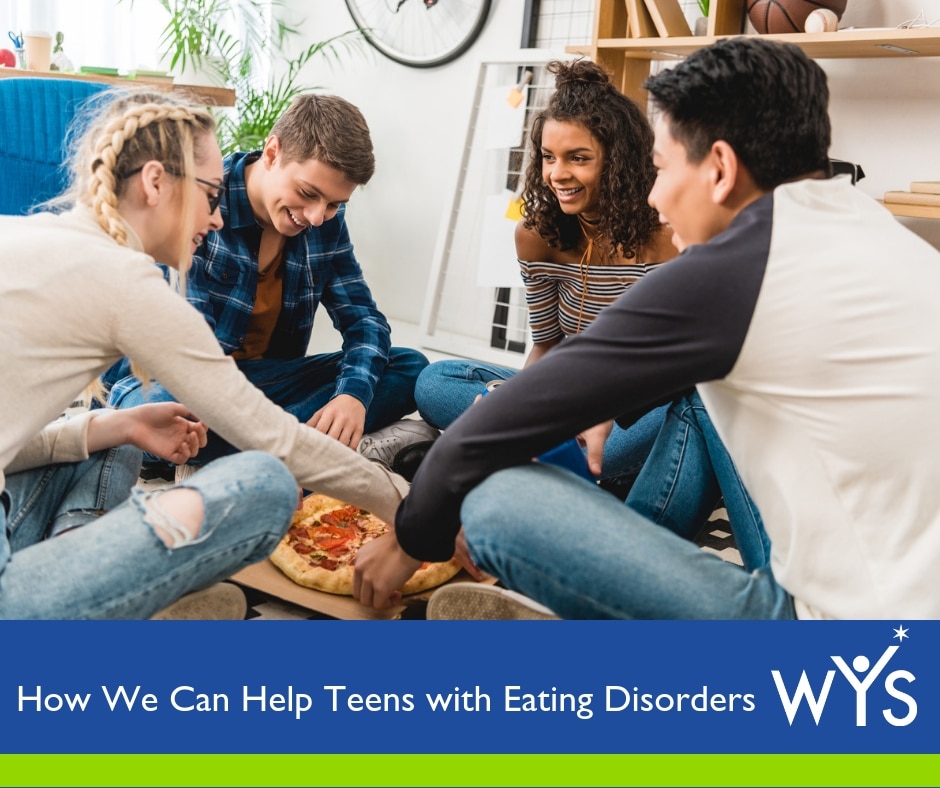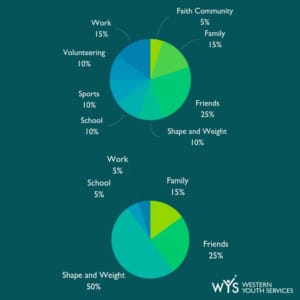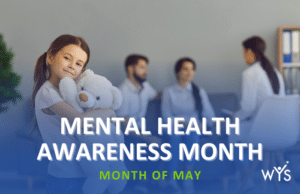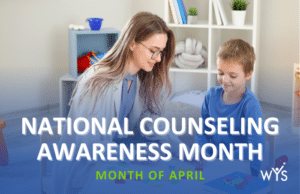
How We Can Help Teens with Eating Disorders
For adolescents, the mind and body are changing and developing dramatically. For some teens, the social attention of peers is exciting and fun, as they develop their own identities. It can also be a tumultuous transition for some teens that struggle with mental health issues such as eating disorders.
The information below is summarized from a discussion with one of our clinicians, Russell DuBois, M.S., Doctoral Psychology Intern. Russell has worked extensively with both adolescents and adults with eating disorders and focuses his research on how to customize care for individuals with eating disorders.
What are eating disorders?
Eating disorders are the use of restriction, binging or purging in association with negative body image and self-esteem, or the desire to change one’s body. Behaviors may include restricting meals, not eating for long periods of time (anorexia), binging and then purging (bulimia), exercise addiction (orthorexia), overeating to the point of feeling sick (binge eating), or a combination of these. Some causes may be related to genetics, traumatic experiences, peer pressure, bullying, or having a friend or family member with an eating disorder.
What are some myths about eating disorders?
- All people with eating disorders are thin. This is a very common misconception that people generally have about eating disorders. People often assume that when they see someone who is very thin, that person is anorexic. They also assume that people who are not thin do not struggle with an eating disorder. The current social appearance ideal is changing towards a more muscular or toned body type for both men and women. Therefore, people who overly focus on their perceived physical flaws or imperfections, may have a toned body type, while also struggling with an eating disorder.
- Only middle class females have eating disorders. Although eating disorders are more common with females, they indiscriminately cut across cultures, classes, races, and genders. The Centers for Disease Control and Prevention found that one-third of those with eating disorders are male. Males may be less likely to report symptoms of eating disorders and less likely to ask for help, possibly due to the stigma surrounding these issues. Another growing population being affected by eating disorders are transgendered individuals. Due to this myth, many males and transgendered teens are not diagnosed until their disorder has progressed to a dangerous state.
- Eating disorders are caused by family problems. Due to the complexity of this illness, the specific cause is unknown. There are many factors that contribute to eating disorders, which is much more complicated than a family member or a family dynamic. However, we have found that when family members are involved in the treatment of an individual with an eating disorder, we see really positive outcomes.
- Eating disorders are a choice. Unfortunately, this can’t be farther from the truth. Eating disorders are complex illnesses that are influenced by genetics, biology, environment, and social factors. These expressions are often linked with past trauma and other mental health conditions such as anxiety or depression. Teens who struggle with eating disorders are trying to cope as best they can with uncomfortable thoughts and feelings often related to toxic stress.
Why do some teens have eating disorders?

There are two major reasons that some adolescents develop eating disorders. One reason is an over-evaluation of their weight and shape. They judge themselves almost entirely on their body weight, body shape, and their ability to control these things. If you think of self-worth as a pie with different areas of your life represented as a piece of that pie, then those with eating disorders will have a larger piece of the pie represented as shape and weight. Shape and weight is therefore a larger influence on how that person feels about him or herself on any given day.
Another reason that some youth develop eating disorders, is due to an attempt to soothe or numb negative emotions. This especially happens with those who have a history of adverse childhood experiences. Those who restrict their diets in response to toxic stress, are attempting to take control of an area in their life that seems controllable. Over time, as the body is negatively affected by deprivation, this cycle of feeling bad and needing to cope with that feeling is perpetuated.
What can we do to help?
Don’t shame. If you know a teen with unhealthy eating patterns, the best thing you can do is try to understand the function of their experience with food. As with all teenagers, they are trying to feel good about themselves. They are trying to fit in and cope with modern life. Though their coping skills are unhealthy, their need to cope is normal. It is ok to be up front and honest with a teen about his or her unhealthy behavior, but do it in a nonjudgmental way, with the goal of understanding the need behind it.

Be aware of social media. While we do not recommend removing a teen’s access to social media in all cases, we do recommend being aware of its effects on a teen. Social media has a strong influence on teens as it has increased the socio-cultural pressure on what they feel they should be doing, eating, and looking like. It is hard for some teens to understand that the information they are exposed to on social media is not representing reality. For example, an Instagram model’s “perfect” photo may have needed various takes and possibly some editing to get it just right. Help teens to understand the difference by increasing their social media literacy. Keep an eye on your teen’s social media accounts to see where their focus seems to be. For teens that are hyper-focused on body image, a small comment online or an absence of comments can have a large impact on how they feel about themselves. If you are wondering whether the teen in your life might have an eating disorder, check to see if their focus is narrowing on body image and physical appearance.
Educate yourself. Jennifer Thomas’ book called Almost Anorexic explains the difference between normal dieting and eating disorders. It talks about the symptoms in a user-friendly, non-stigmatizing way. We also recommend the National Eating Disorder Association and The Healthy Teen Project for information on warning signs, community resources, and treatment information. The National Eating Disorder Association provides a toll-free helpline Monday through Friday by calling 800.931.2237. Visit their website for hours and options for click-to-chat and text, too.
Get help from a medical professional. According to the National Eating Disorder Association, some of the warning signs of an eating disorder include:
- A preoccupation with weight, food, or dieting
- Extreme concern with body size and shape
- Frequent checking in the mirror for perceived flaws in appearance
- Extreme mood swings
- Noticeable fluctuations in weight, both up and down
- Withdrawal from usual friends and activities
- Appears uncomfortable eating around others
Always, seek the advice of a medical professional if you are concerned about a teen’s physical or mental health.
Many of us take for granted the fact that we can choose what we eat and drink. Russell reminds us that “Food is medicine.” We all need food to live, just like we need air to breathe. For youth with eating disorders, they might be self-medicating with unhealthy eating patterns. As we care for the teens in our communities, let’s seek to first understand the function of their behaviors, and then help them find appropriate medicine for their bodies and minds.

Lorry Leigh Belhumeur, Ph.D.
Chief Executive Officer
Western Youth Services






